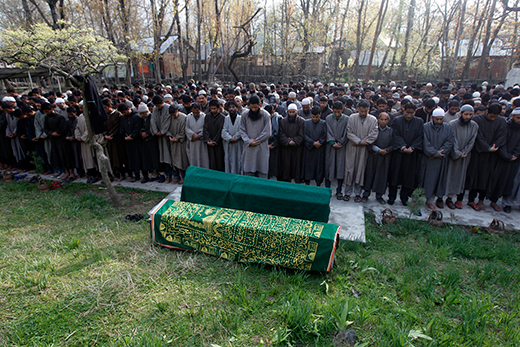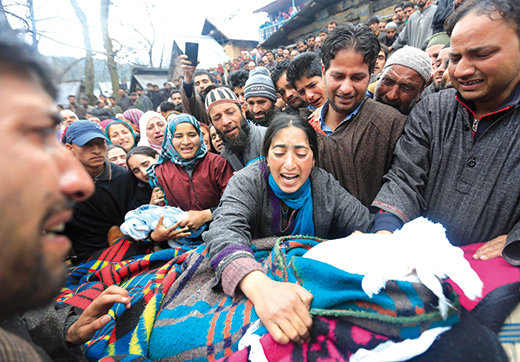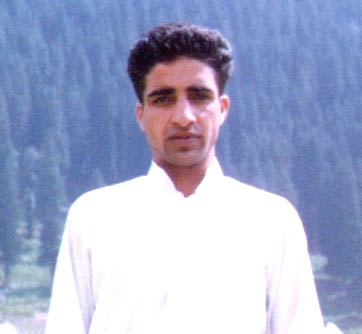As three parliamentarians elected in a low poll are flying for oath ceremony, there are six families grappling with uncertain future. Kashmir Life visits the survivors of six men who were devoured by Lok Sabha elections
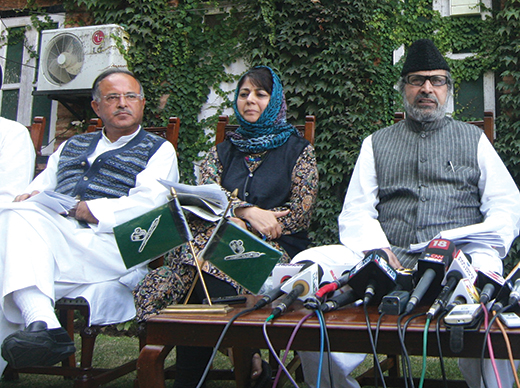
Awantipora
Bilal Handoo
At around 10.30 PM on April 17 this year, somebody knocked at the door of Pandith family at Gulzarpora in South Kashmir’s Awantipora. As the family opened the door, it turned out to be their neighbour, Farooq Ahmad. He informed the family that some persons wanted to meet Mohammad Amin Pandith, a village Sarpanch. Amin followed him. A group of gunmen waiting outside for Amin kidnapped him on gunpoint. The dramatic turn of events at Pandith house at night set off wails and cries. After 15 minutes, the cries got shriller when bullet shots rang outside. Amin’s family members rushed outside—and saw, 45-year-old Amin lying in a pool of blood.
He was shot near Idgah, some 50 yards from his house. After the gunmen vanished into the neighbourhood, a critically injured Amin was rushed to a local hospital—where doctors declared him brought dead. Survived by his wife, two daughters and a son, Amin’s killing was the first ‘political’ assassination in Jammu and Kashmir since the Lok Sabha elections were announced on March 5 this year.
Living in the close range of Army’s divisional headquarters of Victor Force and an Indian Air Force base in Awantipora, Amin’s killing happened at that time when National Conference (NC) and PDP were engaged in war of words—and blamed each other for the attacks on rival leaders and workers.
Several militant groups had called for the boycott of Lok Sabha elections before Amin’s killing. Police later termed the killing as the handiwork of “separatist guerrillas”. “But we don’t know whether the gunmen were militants or somebody else,” said Abdul Rahim, Amin’s brother. However, no militant outfit active in Kashmir has claimed the responsibility for the killing.
His brother said that Amin was associated with PDP—but was not politically active, in recent past. “He did not take part in any election related activity,” he said. “It seems that the gunmen wanted to slit his throat. But as he resisted, they shot him dead.”
Life after parliamentary polls isn’t the same for Amin’s family—the difference is glaring: his wife is a widow now; while his three children, orphans.
Batagund, Tral
Bilal Handoo
At Batagund bazaar in south Kashmir’s Tral, army personnel were busy carrying a search operation on May 21 this year. The driver of the Sumo vehicle cleared the smokescreen: “Army is recording number of family members of every household in the village—ever since, Sarpanch along with his son was killed by unknown gunmen here.”
In Gousia Mohalla of Batagund, Mir House was disturbingly quiet. In the compound of the house, Shabeena sitting with her visiting mother got unnerved upon the arrival of a stranger who named himself a reporter: “Heart chum wyen kamzoor gomut, khouchaan chas.” (My heart has become weak; I fear quite often now). Shabeena who is in her early forties has every reason in the world to feel shattered. A month back, some unknown gunmen attacked her home and killed her father-in-law (Sarpanch) and her husband. It was April 21, three day before south Kashmir went for parliamentary polls.
Shabeena said that she was against the decision of her father-in-law to contest the panchayat elections held in Kashmir in 2011. The election which witnessed a record over 80 per cent turnout—has now pushed the daughter-in-law of Mir family of Batagund into the abyss of deep mourning. “I was apprehensive against my father-in-law’s decision to contest panchayat elections and my husband would also press his father against that,” she said. “But he would always say, ‘I haven’t become sarpanch for my own sake. I want to serve people.’ ”
Ghulam Nabi Mir, the slain sarpanch of Batagund kept ignoring his daughter-in-law’s concerns. And then, April 21 dawned and she met her nightmare. That evening, her ailing father-in-law was taking rest in his room facing the courtyard. Her husband, Firdous Ahmad, a panchayat level inspector was watching television in an opposite room. Shabeena was serving the dinner to her other two sons in the kitchen.
At about 9.05 PM, she heard the gunshots. The very sound petrified her. She told her sons to stay quiet. And then, she heard her husband’s scream! Without giving any thoughts, she went outside the kitchen—only to find her husband seated near the door, gazing towards his father’s room with shell-shocked facial expressions.
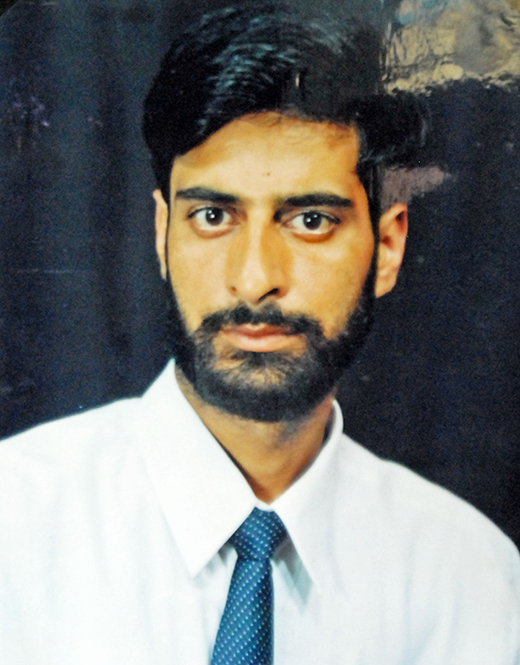
The unknown gunmen had entered her home through the broken wall which was being renovated. They opened fire into the room of the family elder through the window. Upon hearing gunshots, Firdous rushed inside his father’s room—and ended up receiving a volley of bullets. He slowly crawled outside the room where he stood frozen, watching bullets being pumped into his father’s body.
Shabeena and her two sons—one, a class 11 student; and other, a class 9 student, sat beside Firdous without having an idea that he too had been hit by bullets. He asked for water and told his wife: “They killed my father, they killed my father…” But none of them was mustering courage to step inside the room where the family elder was lying dead in a pool of blood. Meanwhile, the gunshots kept ringing inside the courtyard of Mir House. All of them took prostrated positions. Shabeena then shielded her sons by putting herself over them, while her youngest son (five-year-old) was fast asleep in other room. But fearing for their lives, Shabeena screamed out: “Please spare my kids and husband.”
Her plea had an effect. The gunshots stopped. But what followed after that—shook her, to the core. Her father-in-law was already lying dead in his room. Her husband then asked her to take him to hospital. As she lifted his pheran, a fountain of blood came out and spilled on the floor. She grew even more panic. Firdous’s elder son then took his father inside the car and left for hospital. But after covering a distance of a few meters, Firdous lost the battle of his life.
“I don’t know who killed my father-in-law and my husband,” she said. “But there is one thing which grieves me the most: ‘If the assailants had some problem with my father-in-law’s activities, they should have at least warned him—even Islam teaches us that guilty should be at least given three chances to correct himself. But they gave me no chance.”
Shabeena broke down number of times while recollecting the incident that devastated her life. “My husband was known for his gentle nature; they should have at least spared him,” she said in an inconsolable tone. In between, one of her neighbours called her name out: “Rani.” It is her sobriquet. She quickly replied: “Bi kous Rani roozis wyen, behay baneyas wyen faeqraen (I ceased to be a queen; I have become a destitute, now!”)
Amlar, Tral
Bilal Handoo
In this pristine locale of Tral, a blood of village numberdar was spilled in the night of April 21—much to everyone’s awe, and shock! Mohammad Anwar Sheikh, 64, of Amlar village of Tral was known for his amicable nature. His killing has remained a mystery of sorts for the villagers till now.
One month after his killing, villagers in Amlar had organised a religious gathering in his remembrance. The place where Sheikh was found dead has been named as Shaheed Anwar Chowk. Inside the courtyard of his house, scores of women had turned up for the remembrance.
In his slain father’s room, Dawood Ahmad, 30, recalled the evening of April 21—the day, he lost his father. After returning home from orchard, Dawood’s father Sheikh had gone to offer magrib (evening) prayers in a nearby local mosque. Upon reaching home, he asked for dinner. Soon after finishing the same, he left for last prayer of the day to a local mosque.
It was pitch-dark outside. As he walked a few meters, three masked men cut short his walk. They came closer to him and shot directly into his heart. After three shots, he was done. Upon hearing the gunshots, Shiekh’s wife went outside and saw three men running away. She asked them: “Is everything alright, sons?” They were, probably, assailants—who had no time to reply her.
She grew anxious and walked towards the local mosque. She had a torch in her hand. As she approached near the body, she saw a man crumbled down on the ground, hardly having a hunch—that it was her own husband. The moment her torch flashed his face, she lost her consciousness and fell flat on the ground.
Sheikh’s death has not only jolted his family, but entire Amlar village where he was known for his community service. “My father was influenced by Jamiat Ahalhadees school of thought,” Dawood said, “But some elements in village were not happy with his religious belief. Maybe, this has something to do with his killing.”
The slain numberdar has left behind two sons. Both are married and are working in police department. There is a growing whisper in the village—that police links of his sons might had led to Sheikh’s killing.
Shopian
Bilal Handoo
The day South Kashmir went to polls, a young teacher Muhammad Zia-ul-Haq, 34, died complying a government order. Known for his humility, Haq was the sole bread winner of a family of seven, including his wife and an eight month old daughter, Mariya.
Haq was posted in a local Government Girls Primary School and was deployed on duty as polling officer at a booth in Nagbal area of Shopian. On his way back to the town along with other polling staff, the vehicle carrying them was attacked by gunmen near Nagbal, killing Haq on the spot while five others were injured.
Hailing from Hurpora village of Shopian and a son of a small time shopkeeper, Muhammad Yousuf Wani, Haq was recruited under the Rehbar-e-Taleem scheme of the government in 2004 and got regularized in 2009. Haq’s killing shattered his family’s dream. His father said that he has lost all the reason to live. “But I might have to live some more days to look after Haq’s daughter,” Wani said.
Haq’s wife, Sumaira—who hails from the neighbouring Manloo village of Shopian, is grief-stricken. She was married to Haq only 18 months before his death. “Before going for poll duty, he promised me that he would get a special gift for me on his return” she said. “I never imagined we will have to receive his body.”
Haq’s mother Haneefa is equally shattered. “I have lost my love, my heart,” she grieved. “He was my life. Somebody should get me my son back.” His two sisters have assumed a disturbing silence since Haq’s death.
Srinagar
Safwat Zargar
It had been a busy day at home for Bashir Ahmad Bhat on April 30—the day chosen by Election Commission of India to allow ‘participation of Kashmiris in the democratic exercise.’ Bashir, a mason, preoccupied with his busy schedule ahead of the marriage of his two sisters, had chosen the Election Day for repairing the entrance of his house.
“After finishing the work at the entrance of gate, Bashir took a bath and left for his cousin’s home in Narwara to celebrate the birthday of his nephew,” says Farooq Ahmad Bhat, the older brother of Bashir.
The 23-year-old Bashir returned home at 5 in the evening accompanied by his nephews and nieces. In the meantime, the CRPF deployed in the area had begun to vacate the area. Finishing his evening tea, Bashir left home for a walk. “Mother told him to buy a packet of milk, if he could find any, as there was a shutdown,” says Farooq.
“Instead of milk, Bashir came back dead.”
Bashir was shot dead by CRPF, a few meters away from Nawa Kadal Chowk, when a CRPF vehicle plying on the road had come under stone-pelting. “He was killed on the parapet. He was not even near the crowd,” says Bashir’s father, Mohammad Shafi Bhat.
“He was lying there for twenty minutes during which all his blood was lost. CRPF men didn’t allow anyone to go near his body.”
Earlier in the day the CRPF men posted outside the house of Bashir had asked him for a plate to cut down fruits. “CRPF men had bought cucumbers. They had asked for plates, instead, Bashir gave them a big plate, a knife, salt and red chili powder,” recalls Farooq, while explaining the humble and loving nature of his deceased brother.
“He loved children and children loved him too. He was their favourite,” says Mohammad Shafi, while breaking down.
According to family, Bashir was a ‘quick learner and a master of different skills’. “He has put a huge burden on my shoulders,” Farooq says. “He managed everything from buying milk to organizing necessities for the marriage of our two sisters.”
Bashir’s two sisters were scheduled to get married on 25th of this month. “Marriage has been rescheduled for June 18,” he says. “It’s not a marriage, it’s a deferred mourning.”
Bashir’s family is yet to get the FIR copy registered at Police Station Safa Kadal against CRPF who killed Bashir. “We don’t know whether or not justice will be done with us,” Mohammad Shafi says.
“Only Allah knows.”
Kulgam
Bilal Handoo
On May 8 this year, unidentified gunmen killed a NC Sarpanch Ghulam Mohammed Bhat, 60, in South Kashmir’s Wanpoh area of Kulgam district. He was attacked by two masked gunmen when he was sitting at a shop. He sustained multiple bullet injuries and was rushed to hospital where he succumbed to his injuries.
Bhat is the fourth panchayat member who was killed by the militants since the poll process began for the three parliamentary seats in Kashmir. He has left behind a grief-stricken family, who have paid the price of their elder’s decision to contest the Panchayati elections for the “sake of villagers”.
“He wanted to work for the welfare of villagers—and that is why: he had made up his mind to serve the villagers,” said Bhat’s close relative. “But we never knew he would end up losing his own life.”
Elected village representatives have been targets of “separatist guerrillas” ever since the panchayat elections were held in Jammu and Kashmir in 2011 after a gap of over two decades. Despite threats, an overwhelming 83 percent voter turnout was recorded in these elections.
Since long, panchayat members have been demanding personal security guards at par with legislators. In fact, in recent past, Omar Abdullah said: “It is necessary to step up security measures to protect the sarpanchs in the state.” But panchayat members are rueing: nothing substantial was ever done for their safety.



